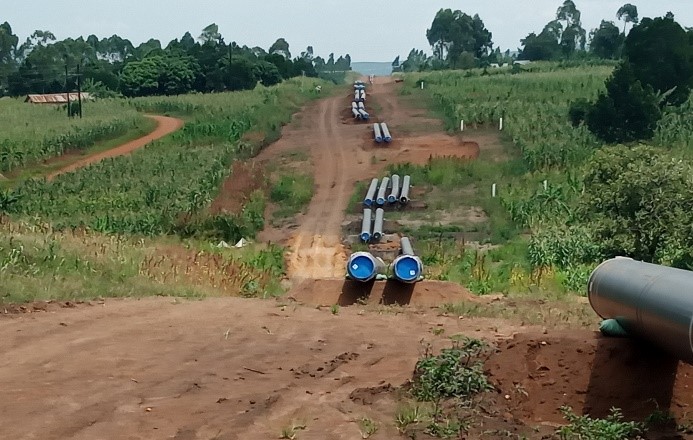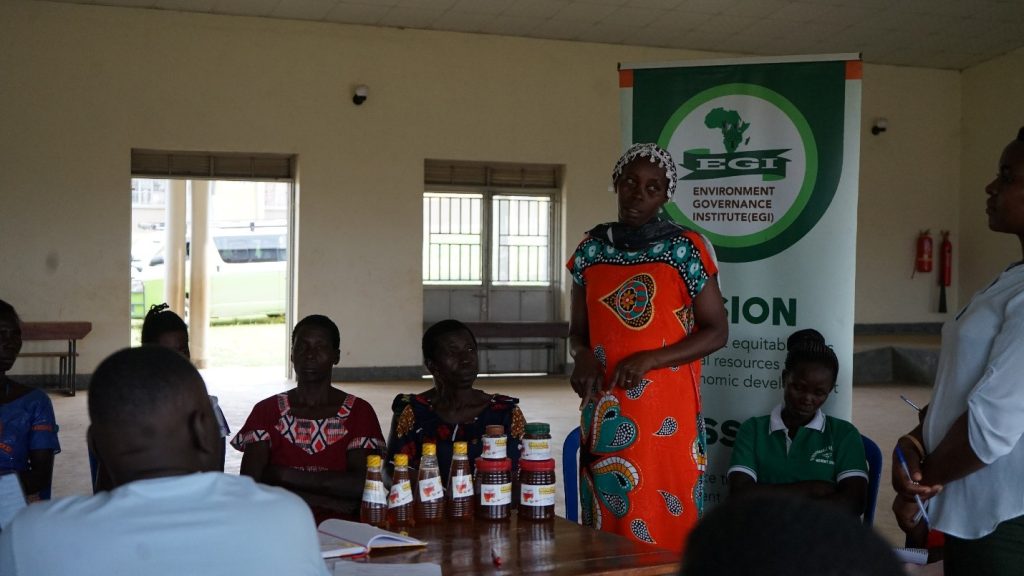Amidst the multiplicity of changes that befell the communities relocated in Kyakaboga’s resettlement camp, oil-affected communities subsisting within the camp continue to grapple with a number of issues, ranging from unfertile land that scoffs at seeds to unresolved court cases seeking justice. socio-cultural conflicts, access to water and healthcare, reduced grazing land, climate change, and livelihood challenges, among others.

In the same vein of engagement, various women who were affected in 2012 by the oil refinery project attest to the fact that the exclusion of women’s issues during relocation has left a trail of emerging impacts. Fausta, one of the single mothers affected, recounted, “Immediately after relocation in 2018, her land and the other 6 households in the resettlement were again affected by the tilenga pipeline, breeding complex unresolved issues.
In September 2025, the Environment Governance Institute (EGI) held a community meeting with the Kyakaboga’s affected communities. The meeting aims at fostering new climate resilient livelihoods, identifying new opportunities for value addition and skilling for women groups, and fostering avenues for community advocacy for off-grid solar solutions in the resettlement.

In August 2025, communities through their leadership, pushed for the grand opening of the community market that had stalled for years since time of its establishment by government; consequently, the launch was realised through coordinated supported by EGI and local civil society activists, creating a vital local economic launchpad within the community. Seeing this opportunity, EGI sought strategic approaches beyond advocacy by leveraging community livelihood needs, tapping into this new marketplace with climate-resilient livelihoods.
The discussion explored climate-resilient opportunities, such as mushroom farming, that can thrive in dry spells. Prior to the rollout, discussions enabled EGI to identify various resource needs available within the community to support the endeavour. While coffee husks were identified as a rare raw material within the community for mushroom substrates preparation, communities allayed the fear of the available alternative resource, such as maize and millet husks, which can easily be obtained. EGI encourages communities that the mushroom production is economically viable and requires little capital to maintain it. One packet of mushroom spores’ costs about UGX 3000; each pack can make four gardens of mushrooms, which can be harvested within a short period of 2 to 3 weeks.
We engaged women and youth groups, introducing them to the potential of mushroom production, a venture requiring little space and less water, perfectly suited for the constraints of the camp and the erratic climate. For the women’s group that ventures into beekeeping, the engagement shifted gears. We aligned on best practices for value addition: how to filter, bottle, and brand their honey to command a better price on the market shelf.

These ongoing strategies also complement the unceasing efforts by communities to advocate for a shift to clean energy as opposed to ongoing oil developments in their localities. Local leaders and other civil society partners who participated in the engagements added Local leader and other civil society
partners who participated in the engagements added their voice in the bid to push for access to social services and water resources to within the community.
As community rights advocates, joint collaboration can be pivotal in addressing the emerging concerns of oil affected communities in Kyakaboga’s resettlement camp, fostering long-term community demands for solar solutions and investing in community climate-smart livelihoods initiatives need to explore different perspective and approaches to sustain community ancestral rights, build resilience and push for phase out to detrimental oil and gas developments.
The call for solar energy is not a mere request; it is a strategic necessity for sustainable development in Kyakaboga’s and Uganda at large.
Blog story
By John Peter Okwi
EGI-Uganda





